Are all of the decisions you make rational?
You’d like to say yes, but I’ll let you in on a secret: none of us make rational decisions 100% of the time. As human beings, we are not perfect in the way we act or in the way we think. As such, from time to time we make suboptimal decisions that we are unaware of! Our brain finds a way to stray away from rational thinking, and instead acts on cognitive biases as a result of trying to simplify information.
The existence of cognitive biases is not something you and I can change. What we can do is use these cognitive biases to increase email signups and the conversion rates of your sign up forms.
I don’t want to keep you waiting longer, so without further ado, here are seven cognitive biases that can be countered to help you hack your email signups.
1. Loss Aversion
This cognitive bias refers to the excess influence that the fear of losing out on something has over the positive effect of gaining something. According to Amos Tversky and Daniel Kahneman (the first ones demonstrate the effect), the pain from losing ‘X’ is greater than the joy of gaining ‘X’.
Regardless of whether or not you actually sell a product/service, or just blog, this irrational way of thinking can be attacked to help you grow your email lists.
Bounce Exchange puts this bias to work by simply asking visitors if they are okay with losing out on revenue. The overlay does not directly ask the visitor if they want to monetize their traffic, rather points to the loss, and uses that as a trigger to persuade.
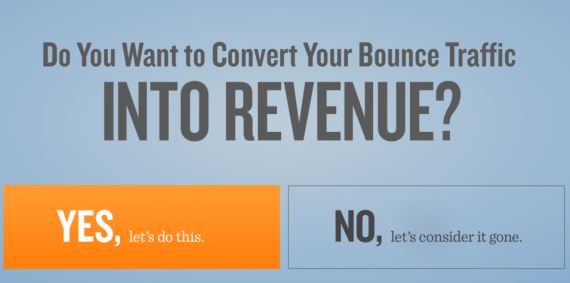
In order to combat the loss aversion that visitors may have, you need to rewrite your copy to reflect the loss that visitors will encounter if they do not opt-in to your offer. If you convey a message to visitors that they are losing out on more leads and revenue you’ll strike fear and urgency in the visitor. When you are able to create a sense of urgency, your conversion rates are sure to increase. So let’s take a look at how to do that with the Framing Effect.
2. Framing Effect
The framing effect is an irrational way of thinking, in which people react to one offer, presented in different forms – depending on the light in which the choice is presented – in completely different ways.
The bottom line, in this case: people tend to avoid risk when a positive frame is presented but seek risks when a negative frame is presented.
Let’s go back to that last example.
“Do you want to convert your bounce traffic into revenue?” The question is asked in a positive frame; they don’t come out and state a risk rather they point to a benefit. As such, the large majority of the visitors will look to avoid risk, leading them to select, “Yes, let’s do this.”
3. Bandwagon Effect
The bandwagon effect is in essence the same thing as ‘social proof’. The bandwagon effect is what leads to an increase in the acceptance rate of ideas and trends based solely on an increase of acceptance by others.
Tapping into social proof is the best way to combat the bandwagon effect. When someone sees that either a large group of colleagues has bought in or a group of well-known influencers has joined the deal too, the visitor is likely to sign up for what you are offering.
The following is a partial view of the homepage of the 4 Hour Work Week. Aside from properly using the call to action, ‘Start Here’, the site also makes terrific use of all the site’s real estate. The two longer testimonials are placed to the right, while three shorter, and very well known publications are placed to the left. Coincidence? No, it’s capitalizing on the F-Pattern that ensures social proof is noticed.

Anyone doubting the benefits of GrowthHackers is instantly convinced otherwise. Not only do they mention the quantity, but they also mention the quality.
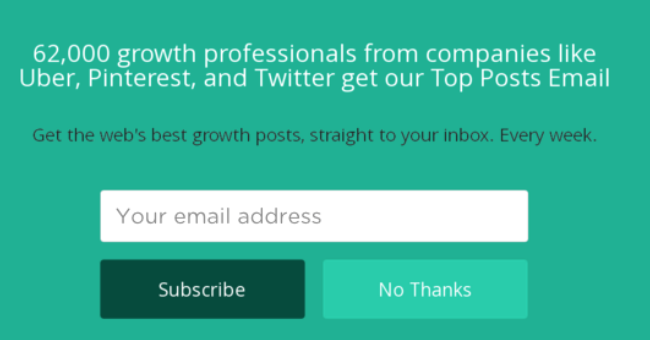
Whether or not they were going to join before, the tide has turned to a point that not signing up seems almost inconceivable.
4. Commitment Heuristic
“Don’t be a quitter” is a statement that all of us have probably heard from others or something we tell ourselves. The commitment heuristic causes us to believe that since we’ve already invested in a decision or a certain project, we should continue to do so.
At the last startup I worked at I fell victim to the commitment heuristic. I worked at the same startup for almost three years, even though I could tell after a year and a half that it was going nowhere. Why did I stay? I did not want to be a quitter. I told myself that I had to stay the course as I had already invested time and energy into it.
When it comes to lead generation, your business should capitalize on this mindset. Here’s an example from Neil Patel from his website Quick Sprout. He knows that the majority of his visitors create content. He also knows that what they need is for their content to be “king”.
The phrase “better content” makes perfect sense. Pointing out to potential leads that they can take their game to the next level – whatever that might be – is a great tactic to implement in order to use this cognitive bias to increase email signups.
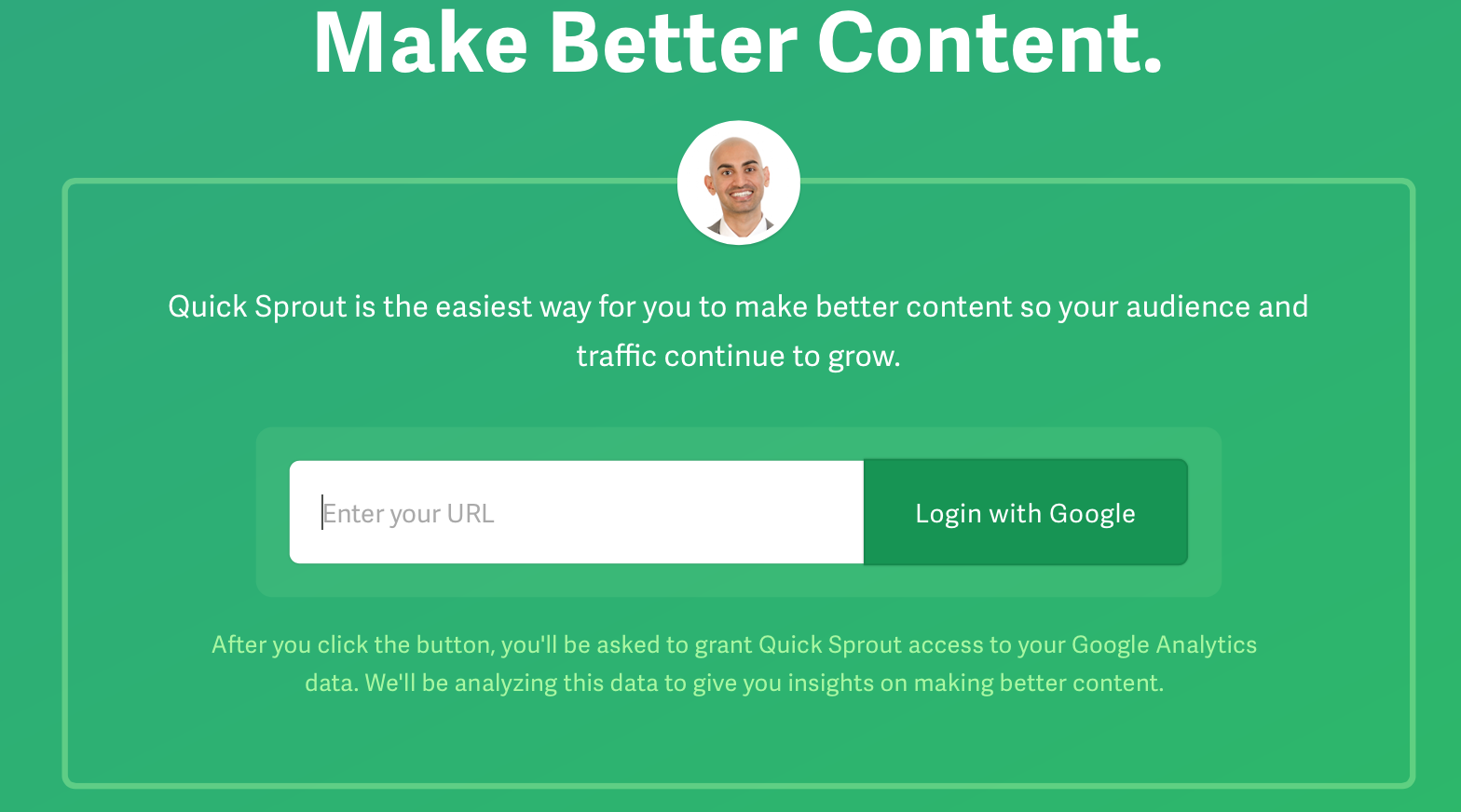
5. Anchoring Effect
The anchoring effect is in essence our mind taking in a first piece of information and attaching to it too much weight when we then make a decision later on. That first piece of information is acting as an anchor (our brain is at a standstill).
The most common use of the anchoring effect for business growth is in sales. As pointed out by Neil Patel in an earlier Kissmetrics post on psychological tips that improve product pricing, “For example, if someone mentions “$300” in regards to a SaaS product that you are considering buying, then your mind is anchored by that number. Thus, when you see the true price — $30 — then you might think “Wow! That’s a great price!” Why? Because you were thinking $300 before”.
This idea however can also be implemented to increase email signups. For example, let’s say you sell a digital product. Either on the page that the visitor is on, or one he/she was directed from, the product was advertised for $59.99. Once the person has seen that price, this is the “anchor”. To convert the visitor into a lead, you offer the same product for $45.99 (for example) in exchange for subscribing to your newsletter.
Here’s an example from dapulse. You’ve got your standard pricing tables. No big deal.

The goal is for every visitor to pick a plan. That however won’t happen. After seeing the above prices, the visitor continues to scroll down, and here is where DaPulse makes use of anchoring to instantly generate new leads.
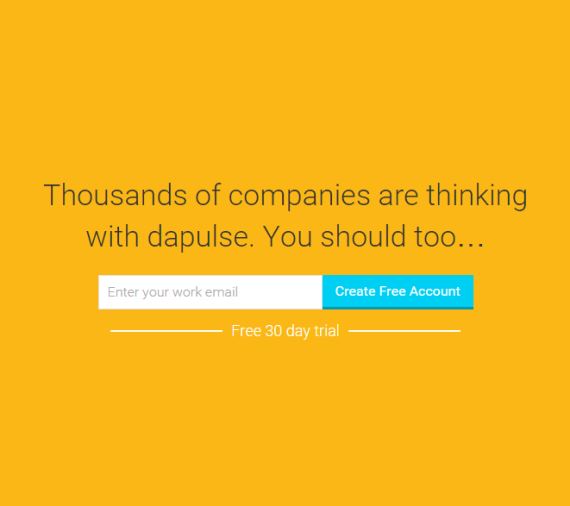
The visitor came to their site knowing that he/she was looking to improve their project management process. The highlighted “Standard” plan acts as an anchor for this free offer, enabling the company to maximize email signups.
6. Confirmation Bias
The confirmation bias is, in short, one’s fear of new information, and thus leaning on current views to make decisions. Technically speaking, this is our tendency to search for or interpret information in a way that confirms our current train of thought instead of trying to see if our current belief is correct or not.
Here’s a relevant example for our daily life: If you’re convinced that caffeine makes you more alert, you’re going to feel more alert when you take in caffeinated beverages —and you won’t when you are given anything else.
Like the other cognitive biases, in this case too, you can capitalize on this type of thinking in order to increase email signups by assuring the visitor that their current beliefs are correct. Singing up to your newsletter will only strengthen that belief.
Case in point, Groove. In the “Startup Journey” blog, the text refers to their success and uses it as a selling point to other entrepreneurs. The takeaway for me (someone that is subscribed to their blog) is that they are hitting these results. If we join them for lessons, we’ll be able to do that too. There is no need for me to go elsewhere.
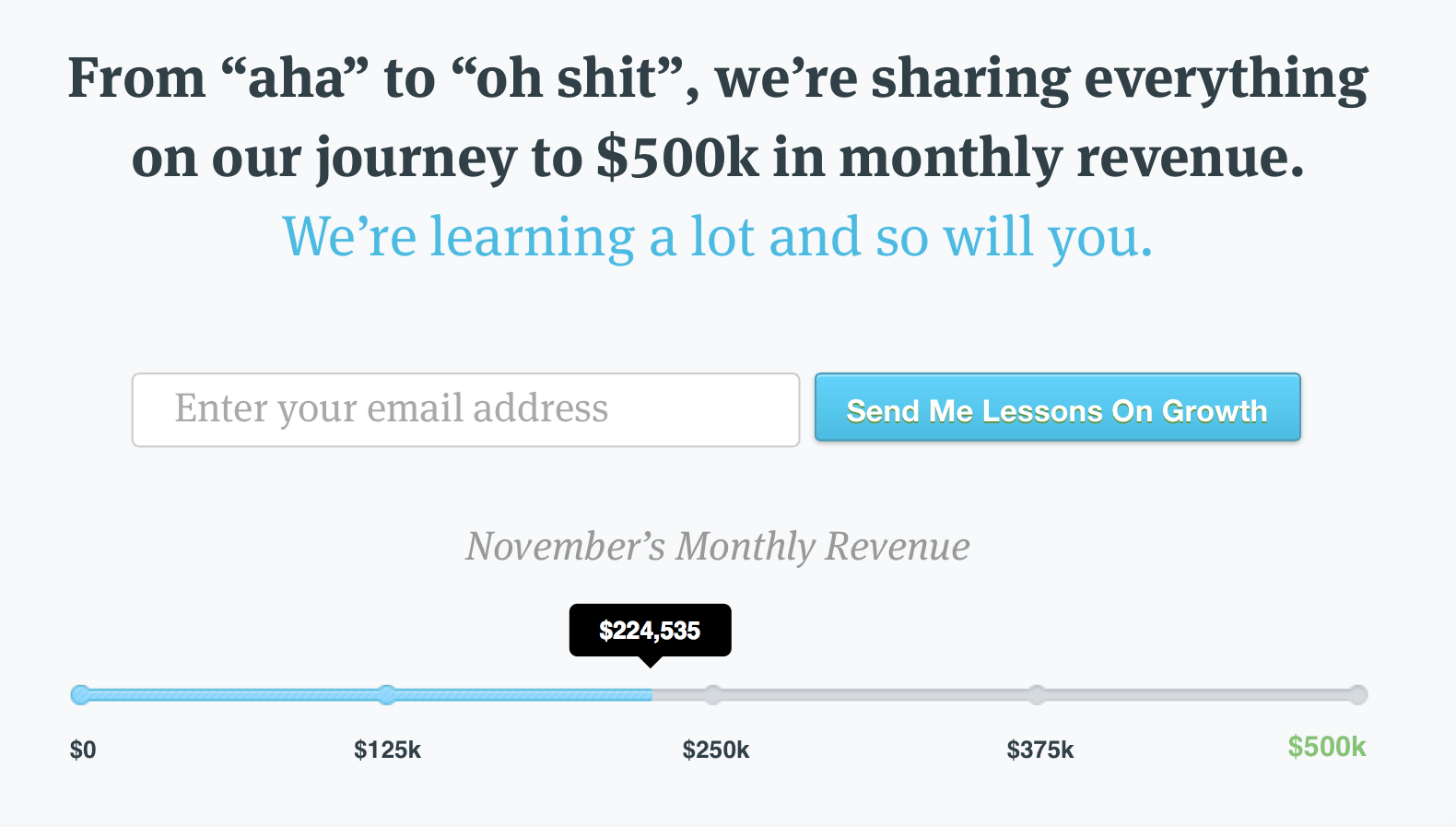
Whether or not what they experience becomes reality for me and others is another story. The same goes for that third cup of coffee – that caffeine may or may not be kicking in (though you think it is).
7. Belief Bias
Have you ever come across an offer and skipped on opting in because it sounded “too good to be true”. Even if the offer is the exact same thing you are a promoting, an offer that gives off a vibe of being too good to be true won’t convert at as a high of a rate as you would have expected.
In order to capitalize on this bias, the email signup form that you are using must focus on showing visitors the overall result that the product or newsletter will have on them. Don’t promise anything or zoom in on the benefits, rather relay the realistic results of its use to the visitor (like in this example).
Here are two overlays from Cloudways, one older and one that was in action recently. I don’t have results for either campaign, but odds are that overlay number two was much more successful because it’s more realistic (sorry, don’t completely buy the “double” aspect).

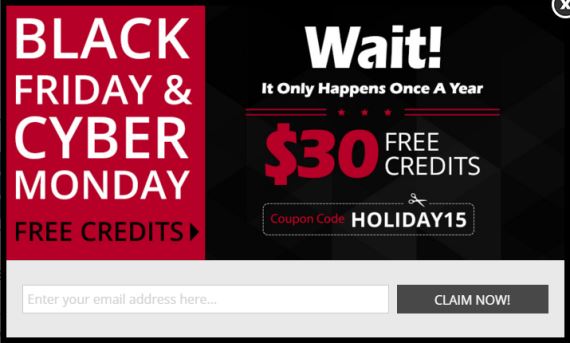
I’d like to think that I am rational, but this is one example in which I would have skipped a great offer because it was “too good to be true”.
Time to Implement
The different psychological tactics and strategies that we can implement are endless. In working on this post I was blown away by all the different biases and irrational ways of thinking that cloud our minds on a daily basis.
We are an imperfect breed and now it is your time to pick out one of these cognitive biases to capitalize on in order to grow your business. I’m curious, which one will you be choosing?
About the Author: Ty is a digital marketing enthusiast that can’t get enough social media marketing and content marketing. He is the inbound marketing manager at StoreYa where he spends his days searching for the newest social marketing scoop and creating amazingly awesome content. If you’d like to chat with him, feel free to connect with him on Twitter or LinkedIn.
No comments:
Post a Comment